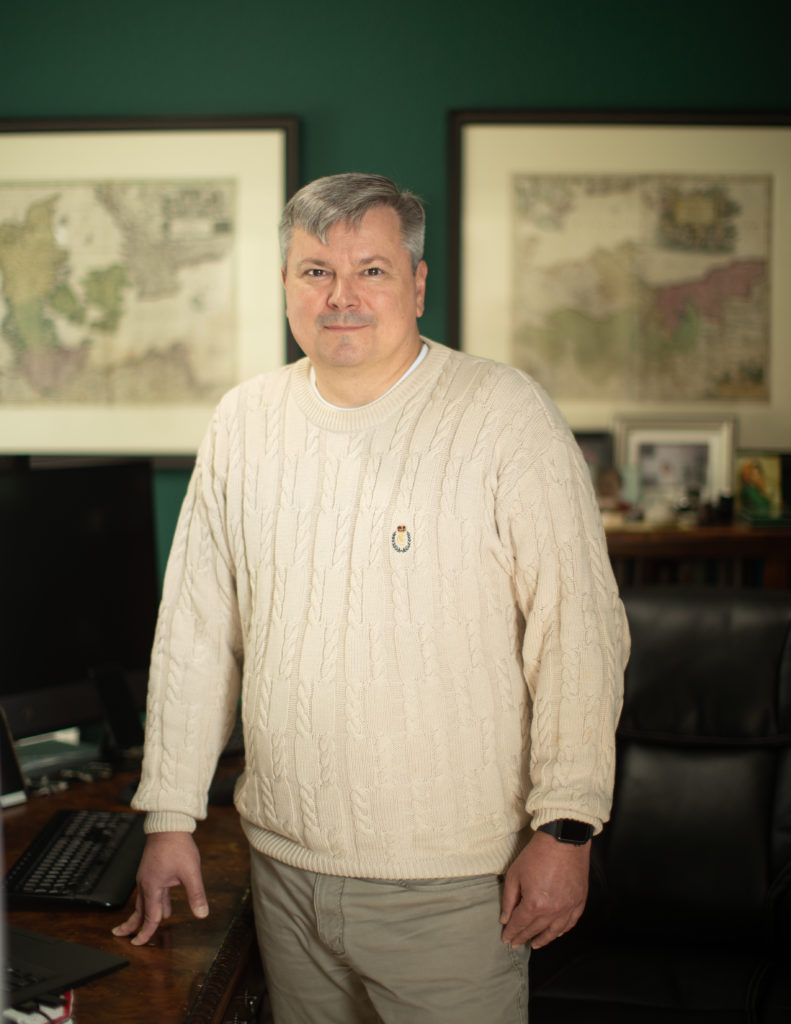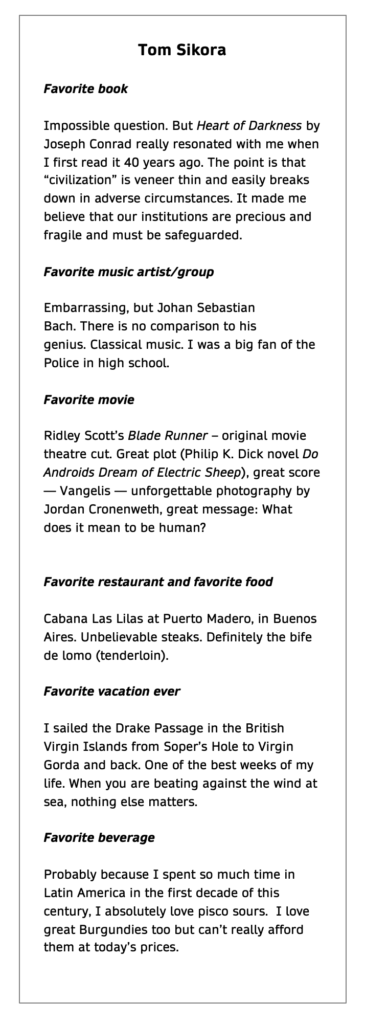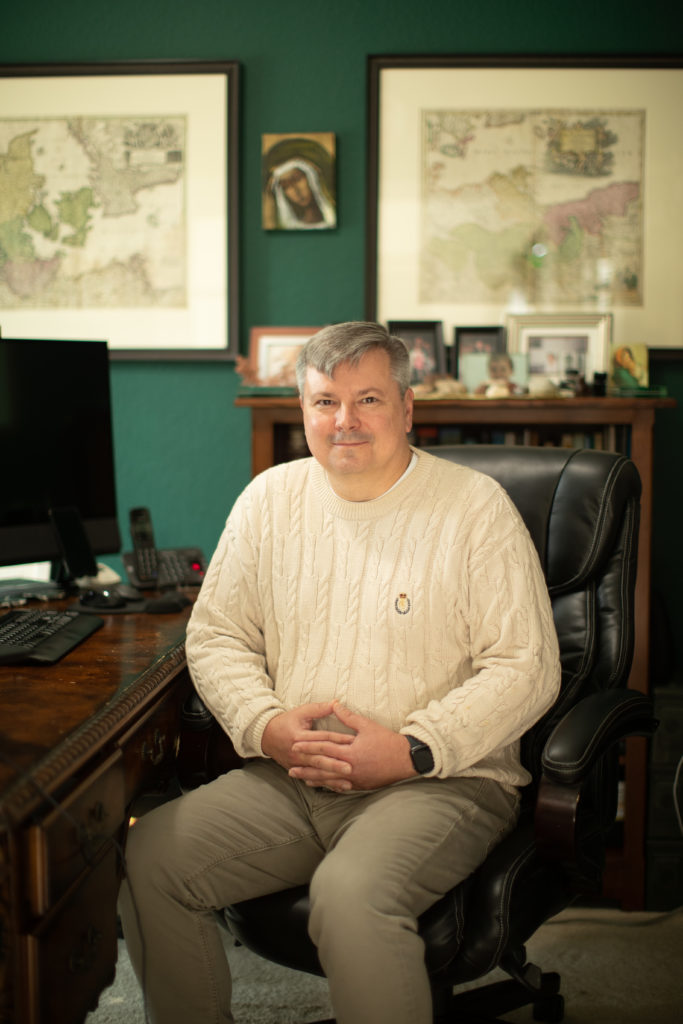
Exxon Mobil senior counsel Tom Sikora has argued cases in scores of courts and tribunals in countries around the world. But the international law expert’s first victory came in December 1980 in Sweden while he and his family were “under arrest” at police headquarters in Stockholm.
Sikora’s parents were doctors and Polish citizens who were seeking asylum as 32 Soviet divisions were sitting on the Polish border threatening to invade. Just 12 years earlier, the Red Army crushed the Prague Spring. The prospect of military intervention was real. Sikora’s father had been working in Tripoli. The family flew to Stockholm but connected flights in Hamburg, where they were forced to deplane and go through immigration before departing to Sweden.
“My father decided that we should try Sweden, where he knew some doctors and was hoping to get political asylum,” Sikora told The Texas Lawbook in a recent interview. “What he didn’t know was that then-socialist and somewhat Soviet-friendly Sweden decided not to accept any Polish refugees.”
Swedish police told the Sikoras that their asylum application was denied, that they were being arrested and deported to Poland on the next Baltic ferry.
“You can’t do that,” a 15-year-old Tom Sikora spoke out in perfect English.
The Swedish police officer was surprised by the teenager’s response and asked why.
“I responded that under international humanitarian law, Sweden had the right to deny us asylum and had the right to deport us, but it had to deport us back to the country from which we entered Sweden, in our case West Germany,” said Sikora, remembering the event as though it were last year. “It did not have the right to deport us to a third country, in this case Poland. I invited the official to examine our passports, where he would find a West German border stamp.”
Fascinated that a young Polish kid was arguing the fine points of international law in English, other Swedish police officials in the office started to gather around.
Police examined the family’s passports and saw Hamburg, West Germany, stamped on the day of arrival in Sweden.
“Those stamps saved us that day,” Sikora said. “The Swedish police official took our passports and consulted with higher officials. He was furious but announced that if we could fund a return ticket to Germany from our own resources, the Swedish police would escort us onto a plane to Germany.”
“I had won my first legal argument,” he said. “How I knew this point of law back then, 41 years ago now, I really do not know. My parents said I was a walking encyclopedia of useless facts, and perhaps this fortuitously useful fact happened to be one I knew.”
For Premium Subscribers: Click Here for a special Q&A with Tom Sikora, who describes what he looks for in outside counsel, his pet peeves and the importance he places on diversity in hiring at all positions.
Four decades later, that 15-year-old boy is now widely viewed as one of the world’s best experts on international business disputes. In fact, other international law experts call him “the master of international arbitration and international law.”
Sikora has led more than 50 international arbitrations with more than $80 billion at stake. He has tried cases in more than 20 countries, including Argentina, Chile, Trinidad, Nigeria, Angola, Libya, Brazil, Canada, France, Russia, Kazakhstan, India, Qatar, United Arab Emirates and Iraq.
“A lot of my work has been against states and against national oil companies,” he said. “I have been involved in cases on every continent and most jurisdictions significant in the energy field. We have been extremely successful in the cases [in which] we try obtaining material damages, injunctions and even specific-performance orders. Most of my work is as a claimant rather than respondent or defendant because, generally speaking, my clients filed where a breach of our rights has already occurred.”
And he won nearly every one of those disputes.
“There are few people in the world with the experience and skillset of Tom Sikora,” said Norton Rose Fulbright partner Kevin O’Gorman. “He embodies everything a large organization values in its in-house counsel – world class experience, unmatched litigation and negotiation skills and the wisdom needed to know when a company should wage a legal fight or settle.”
This year, Sikora serves as chair of the prestigious Institute for Transnational Arbitration, which is considered the world’s leading educational forum on international-dispute law.
In January, the Association of Corporate Counsel’s Houston Chapter and The Texas Lawbook named Sikora as one of two finalists for the 2021 Houston Senior Counsel of the Year Award.
Many of Sikora’s biggest cases are confidential and seldom are made public.
But in 2020, Sikora led Exxon Mobil to a series of major victories in a head-to-head dispute with Canada before a tribunal seated at the International Centre for Settlement of Investment Disputes at the World Bank.
The 15-year dispute under the North American Free Trade Agreement, which involved Mobil before its merger with Exxon, resulted in Canada paying Exxon Mobil $26.3 million.
In 2004, a Canadian regulatory board ordered energy companies with producing assets located offshore of the provinces of Newfoundland and Labrador to spend a specified percentage of their revenues on research and development services within the province, whether such services were wanted or needed.

An international arbitration tribunal ruled in 2011 that the measure violated Exxon Mobil’s rights under NAFTA and awarded damages to the Texas-based oil-and-gas company. The Canadian regulatory authority, however, kept charging the company the service fee.
Sikora and Exxon Mobil hired Norton Rose Fulbright to file a separate, follow-up petition in 2015 before the World Bank seeking damages accrued from 2012 through 2015.
The World Bank appointed an arbitration tribunal to hear the case that included Sir Christopher Greenwood, a judge of the International Court of Justice; Gavan Griffith, the former solicitor general of Australia; and William Rowley, a leading Canadian and United Kingdom-based international arbitrator.
Canada asserted a number of jurisdictional objections to Mobil’s second claim, including an objection that a 2015 claim arising from a 2004 measure was time-barred by NAFTA’s three-year limitation.
After holding a week of evidentiary hearings, the tribunal rejected Canada’s objections in a July 2018 decision and allowed the case to proceed. The panel later allowed Mobil to significantly expand its case for damages to include future losses during the entire productive lives of the underlying assets, which was set at 2040.
The case is one of the rare international treaty cases under NAFTA – now the United States, Mexico, Canada Agreement – in which an investor such as Exxon Mobil brings a direct claim against a foreign government in arbitration.
“The settlement in the Mobil v. Canada case is believed to be the first ever between Canada and an upstream energy investor that resolves claims under NAFTA or a similar treaty,” O’Gorman said.
Sikora, according to O’Gorman, was involved in every aspect of the case.
“Tom was an integral part of every decision, witness interview, expert testimony, argument, drafting of submissions and hearing,” O’Gorman said. “Tom also took the lead in negotiating and crafting the settlement that ultimately resolved the case, which involved prolonged and intense negotiations with both the federal government of Canada as well as government of the Province of Newfoundland and Labrador.”
“The tremendous value that Tom added to the case defies complete explanation, but it suffices to say that his contribution was instrumental to achieving the successful result for Mobil,” he said.
Sikora said the case was particularly challenging because the lawyers across the table were from the Trade Law Bureau of Global Affairs Canada and were extremely experienced in NAFTA disputes.
“Ironically, in terms of dollar value, the NAFTA case was one of my smallest cases,” he said. “But in terms of complexity of the legal issues, including questions of limitations, res judicata and valuation, it was one of the hardest.”
Sikora was born in 1965 in Wroclaw, Poland, which was home to one of the final great battles of World War II. Then known as Breslau and a part of Germany, the city was a Hitler stronghold. The Soviet Army conducted a three-month siege in the spring 1945 that destroyed more than half of the city.
“The city I remember as a child was one of isolated islands of surviving pre-war buildings among endless grassy lots where buildings once stood and countless construction sites where the communist government was putting up modernist, box-like apartment buildings for the burgeoning population of baby boomers,” Sikora remembers.
“My sense is that growing up in a totalitarian dictatorship, you grow up much faster because you have to be mindful what you can say and what must not be said,” he said. “It’s not something you understand as a child.”
When Sikora was five, he almost cost his father his job when his kindergarten teacher asked what his father did in his spare time. He responded that his dad listened to U.S. radio broadcasts.
“Thankfully, it was chalked off to my vivid imagination, but it was a close call,” he said.
Sikora’s father was a surgeon at a tuberculosis hospital and an assistant professor of anatomy at a medical school in Wroclaw.
“To make ends meet, in what was back then a desperately poor Poland, he took a third job as a surgeon in the Central City Emergency Room,” he said. “As a result, I fairly rarely got to spend time with my father, and it was very valuable to me.”

When Sikora was 3 years old, his mother started attending medical school. She had intended to study medicine but was expelled from high school in the 12th grade for being labeled “politically unreliable.” That, he said, was “the reality of growing up in the Eastern Bloc.”
“When the world around you is built on a web of lies, taboos and brutal political suppression, it is impossible to avoid,” he said. “You are either for the system – often because your parents are benefitting from the system – or against. Very early on, maybe by the time I was 8 or 9, I knew which side of the barricade I was going to be on. I was going to stand up for truth. My choice perhaps was easier because my father was deemed ‘politically unreliable.’”
Sikora’s great uncle, a University of Warsaw physics professor, was found in a mass grave that was part of the Katyn forest massacre of about 22,000 Polish officers executed on orders from Josef Stalin. In addition, Sikora’s father’s older brother was a Catholic priest.
“On that basis, the authorities determined that my father would likely be prone to ‘antisocial thought’ and put a black mark next to his name,” he said. “I was well aware of that situation already when I was in elementary school.”
With two working parents, Sikora had a lot of alone time. His family said young Tom taught himself to read at age 3 by looking at store names and street signs. In addition, no TV broadcast was available until around 5 p.m.
“I went through the entire encyclopedia from A to Z in first grade,” he said. “I must have been an insufferable know-it-all.”
When Sikora was 11, his father was hired to work for an American oil company in Tripoli, Libya. During four years of school in Libya, Sikora learned to speak English.
Sikora finished high school at the International School in Frankfurt. He applied to Harvard, Yale, Princeton and Stanford, and all accepted him.
“My problem was that I was extremely good at every subject. I loved history, but given the professions of my parents I was truly outstanding in biology, chemistry and math,” said Sikora, who started college thinking he would become a doctor. “It was the fall of my junior year that I figured out that I just did not care how many membranes there were in a cat’s abdomen and I couldn’t stand the stench of formaldehyde. It gave me an awful headache.”
He did a double major in history and history of literature at Harvard, and then went for a Ph.D. in political science at Columbia. But Columbia required that he select a minor field. The university had a long list of fields related to political science.
Sikora stopped at “international law.”
“I had absolutely no idea what it was, but it sounded better than political economy,” he said. “And so I checked that box. The rest is history. I was required to take a course in my minor in the fall of my second year. So, I picked Louis Henkin’s International Law.”
During his two years at Columbia studying international security policy, the Polish trade union Solidarity won the first partially free elections and formed a new government.
Sikora spent three years as an adviser to Poland’s government, first for the Ministry of Finance on negotiating a reduction of the crippling international debt and then the Polish Foreign Ministry on U.S. relations, the Gulf War and NATO accession.
“It was a heady time for a 25-year-old kid,” he said.
In 1992, Sikora went to law school at the University of Virginia and then was hired as a lawyer at Vinson & Elkins in Houston to handle international energy disputes.
Sikora said he went to law school thinking of being an international deal lawyer.
“But my sense of needing to fight for justice overwhelmed my interest in international transactions, and very quickly I gravitated towards litigation,” he said. “What I loved about the law is the rule of law imposes rules of the game, even on the powerful. Litigation was the most direct application of that principle.”
After six years at V&E, Houston-based El Paso Corp. offered Sikora a position in its in-house legal department.
El Paso had just acquired two major energy companies, including Coastal Corp. As a result, it had a large portfolio of international investments involving power plants, oil and gas production facilities and pipelines. Many of them were in arbitration.
“It was an amazing opportunity to run a significant docket of international arbitrations,” he said. “Let’s remember that international arbitrations in the U.S. in 2001 were still somewhat uncommon. They were reserved for the most international businesses.”
Sikora filed an arbitration his first week on the job against Enron on a very large LNG development dispute. Two months later, that first arbitration was subject to the Enron bankruptcy stay, which required Sikora to go to Buenos Aires a few weeks later to deal with the effects of the emergency measures.”
In November 2011, Sikora moved his practice to Exxon Mobil, where he has been since.
“I was lucky to get into international energy arbitration over a quarter century ago,” he said. “As a result, I am one of the most experienced energy arbitration specialists in the world. I love arbitrating my cases and work very hard on each one.
“But in terms of impacts, my biggest contributions at this point are in helping to protect our clients’ right to arbitrate their investment disputes in the future, threatened by a global regulatory overreaction, and in helping to shape the future of international arbitration around the world,” Sikora said. “Guided by that same strong sense of right and wrong, I work to advise and influence governments, international organizations and international institutions.”
